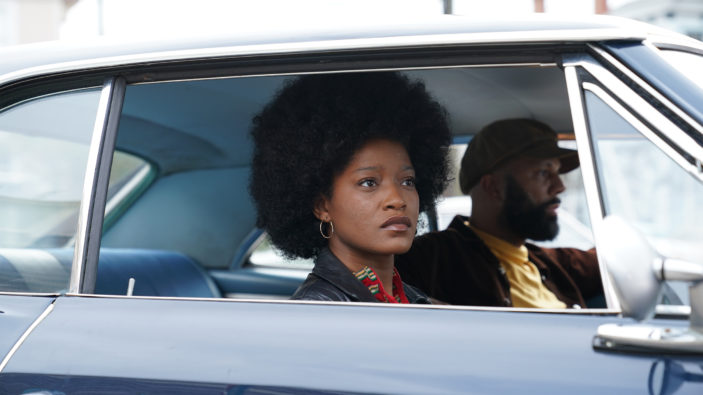
Alice tells the story of its titular character played by Keke Palmer, a slave who has spent her entire life enslaved in a rural Georgia plantation. Like many of her family members, she yearns for freedom. Her recently wedded husband Joseph (Gaius Charles) plots an escape for the entire plantation but the plan backfires due to the owner (Jonny Lee Miller), which sends Alice on the run.
Note: Spoiler alert for the film set-up in the next paragraph
As she escapes, she stumbles on a motorway and discovers the year she has been living in is actually 1973. Taken in at the roadside by a truck driver Frank (Common), Alice discovers that her entire upbringing has been a lie. Motivated by rage and knowledge from Frank (who used to be an activist), Alice vows to go back to the plantation and rescue her people and take revenge on her captors.
The first half of the film features all the expected elements of a slavery drama: over-the-top performances from Caucasian actors, saint-like African-American slaves, failed escape attempts and brutal punishments – something that takes from truth. While the second half attempts period detail from the ‘70s involving Black activism like the Black Tigers, Angela Davis, Malcolm X etc. A germ of a great idea is present and given ample screentime, it would make an interesting story.
Alice is the feature-length debut from Krystin Ver Linden. With her screenplay, the film was inspired by true events, Linden tries to tackle both historical and blaxploitation elements in order to tell a story of empowerment as well as entertainment. The period details are portrayed with clarity and the visual aesthetic is vividly interesting as it has a murky nature for the first half and a beige, timber look for the outer locations. But the two elements do not mesh together, making the film feel like a shell of a good idea with a hollow centre.
The pacing somehow lacks urgency and feels glacial due to the plot having so much free time to go into character and yet so little of it actually mattering all that much. The compressed runtime of 100 minutes makes the arc of Alice feel one-note and anticlimactic as the audience is supposed to believe she adopts modern culture within less than a week. And even though she adopts inspirations from famous Black political figures as well as well-known iconography like Pam Grier, it just all feels performative as it plays upon Blaxploitation tropes and not much upon anything resembling verisimilitude.
As for the cast, Common provides solid support while Miller is almost unrecognizable as the menacing villain of the piece. But appropriately, the star is Palmer and does her best to ground the proceedings with her committed performance. She showcases the utter confusion, vulnerability and strong resolve of Alice effortlessly whilst she single-handedly makes the film worth seeing.
Even with her stellar performance leading the way, Alice is a mixed bag that tries and fails to marry two disparate elements of the African-American experience in a satisfyingly cinematic package.
![]()
![]()

![]()
![]()
TWO AND A HALF STARS (OUT OF FIVE)
Alice is screening as part of this year’s Sundance Film Festival, which is being presented virtually between January 20th and 30th, 2022. For more information head to the official Sundance page.
